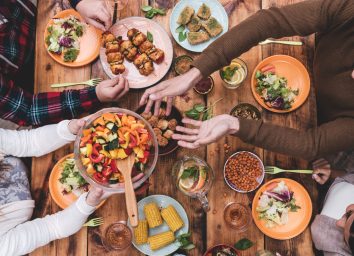15 Simple Tips To Follow To Lose Weight, According to Dietitians
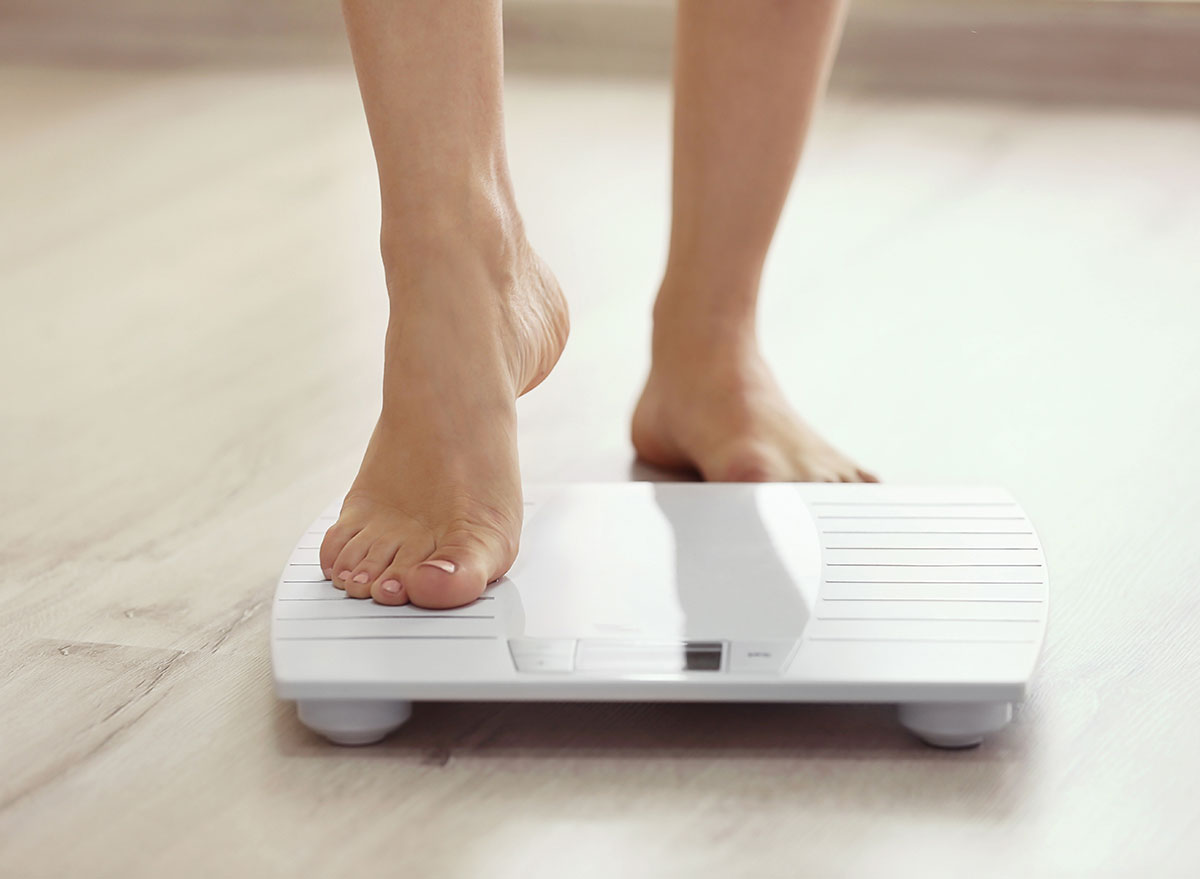
Losing weight is rarely easy—you need to find the mix of eating and lifestyle habits that are best for you. That said, there are some universal tips to follow… and many of them aren’t the ones you think you should be following.
“We’ve been so programmed to think that improved health is dependent on restricting calories, cutting out food groups, and eating less palatable meals—like grilled chicken salad for lunch and dinner every day,” says Laura Burak, MS, RD, author of Slim Down with Smoothies. “Or that we need to buy a diet program made up of pouches of powder, processed snacks, and frozen meals.”
For starters, those unappetizing and costly efforts can’t be sustained. “Ideally, something that’s done today for weight loss should be doable for the long term,” says certified health and wellness coach Alisa Bloom, MPH, RDN, CHWC, ACLM.
So, if you want to lose unhealthy excess weight, try following these sane, science-backed suggestions from top dietitians and health experts. And for even more weight loss tips, check out our list of 15 Underrated Weight Loss Tips That Actually Work.
Stop thinking about losing weight.

Though it may sound counterintuitive, Burak’s number one rule for weight loss success is: Don’t think about it.
“Weight loss is often front and center as the goal, which is why we stop and start diets so often,” says Burak. “But the truth is, learning about nutrition, your individual medical and psychological history, rewiring your mindset, and focusing on yourself as a whole, will naturally lead to healthy, appropriate weight loss that does not just come right back.”
Get even more healthy weight loss tips straight to your inbox by signing up for our newsletter!
Hyper-personalize your approach.

There is not a one-size-fits-all solution for losing weight.
“Each person’s particular preferences, dislikes, and manner of eating food are formed from the days they began eating solid foods. We cannot undo these habits overnight,” says Robin Barrie Kaiden, MS, RD, CDN, and personal trainer.
There are so many factors at play—medical history, genetics, age, lifestyle, and more.
“Food is tied so tightly to our psyche, culture, and socialization, it takes a personalized approach to establish effective and lasting habits,” says Nina Dahan, MS, RD.
Some people do well with a so-called “cheat day,” while others go off the rails if they stray from cleaner eating. Likewise, the keto diet could be a game-changer for your neighbor but set you up for failure if it means you have to miss pizza and wine night, or if you don’t have the energy to work out when you eat so few carbs. Experiment with tweaking things to find an effective formula for you.
Do cheat days actually work? Here’s Why It’s OK to Have a Cheat Day, According to Registered Dietitians.
Stop counting calories—once and for all.

The idea of tracking calories is so 2005, but some people still do it. Instead, focus on the quality of the foods you eat.
“Eating nutritious whole foods—instead of restricting—is how you get healthier,” says Burak. “Think about a small order of French fries that is 500 calories versus a turkey avocado sandwich on whole-grain bread with a salad that is 500 calories. The difference in volume and nutrition speaks for itself.”
When you eat nutritious, satisfying meals, you aren’t apt to reopen the fridge an hour later like you would if you ate, say, a sugary power bar that only has 200 calories.
Here’s How to Lose Weight Without Counting Calories.
Fix the leaks in your gut.

Did you know your gut microbiome is home to roughly 100 trillion good (and bad) bacteria? When your good bacteria are thriving, everything else functions well, too. But when the balance tips and the bad bacteria start to overpopulate (often due to a poor diet), “it boosts gut permeability and results in what’s referred to as a ‘leaky gut,'” says functional medicine pioneer Frank Lipman, MD.
This means that bacteria, food, and waste can slip through the intestinal wall, get into the bloodstream and trigger inflammation throughout the body.
“This inflammation produces weight gain, as well as many other symptoms, including the gas, bloating, reflux, acne, and hormonal issues that bring so many patients to my door,” says Lipman.
The good news? Research shows that your gut microbiome can change within two to four days of eating right. Incorporate these gut-boosting foods—including lots of fermented foods—into your diet today and start feeling the effects. And be sure to steer clear of these foods that can harm gut health.
Know hunger when you feel it.

Emotional stress can cause us to eat our feelings—sometimes without even realizing it. Hunger is a physiological state that is marked by certain unmistakable signs (cue hunger growl).
“By working to recognize true physiological hunger signals versus emotional/stress hunger signals, a person can start on the path to weight loss,” says Dahan.
Also, learning to understand how your blood sugar levels fluctuate after eating can help you pick the foods that will help keep blood sugar levels stable so that you stay full for longer.
Add more plants to your plate.
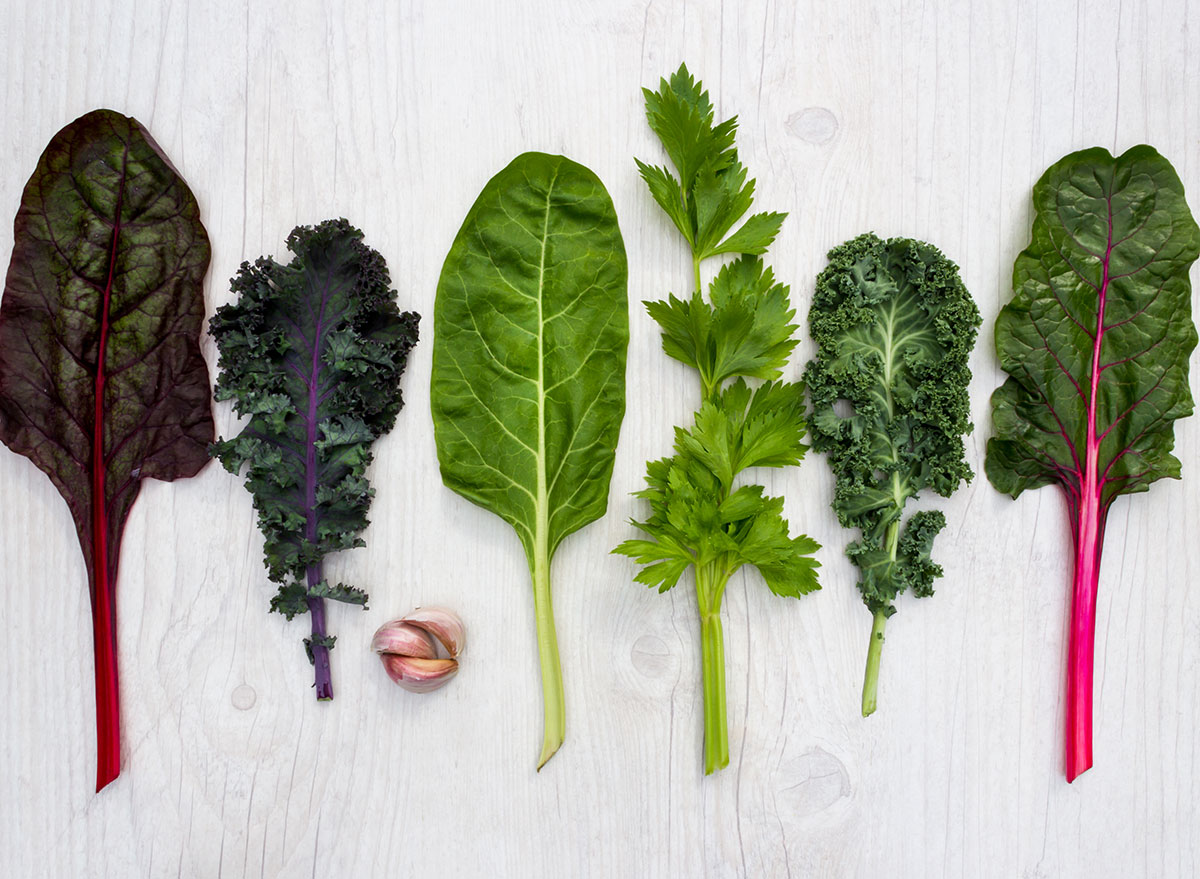
According to Bloom, one of the best ways to kickstart weight loss: Eat more veggies.
“Whether it’s adding a few vegetable servings at lunch and dinner, a fruit for a snack, or choosing to incorporate a plant-centered meal a day,” says Bloom.
“High-water volume foods, like fruits and veggies, provide tons of volume to your meals with the least amount of calories,” says Burak. “The more veggies you add, the more you can visually and physically eat, which are both important factors when promoting health and moving towards consistent sustainable weight loss.”
Been skimping on your veggie intake? Here are 9 Warning Signs You’re Not Eating Enough Vegetables.
Eat healthy fats at every single meal.
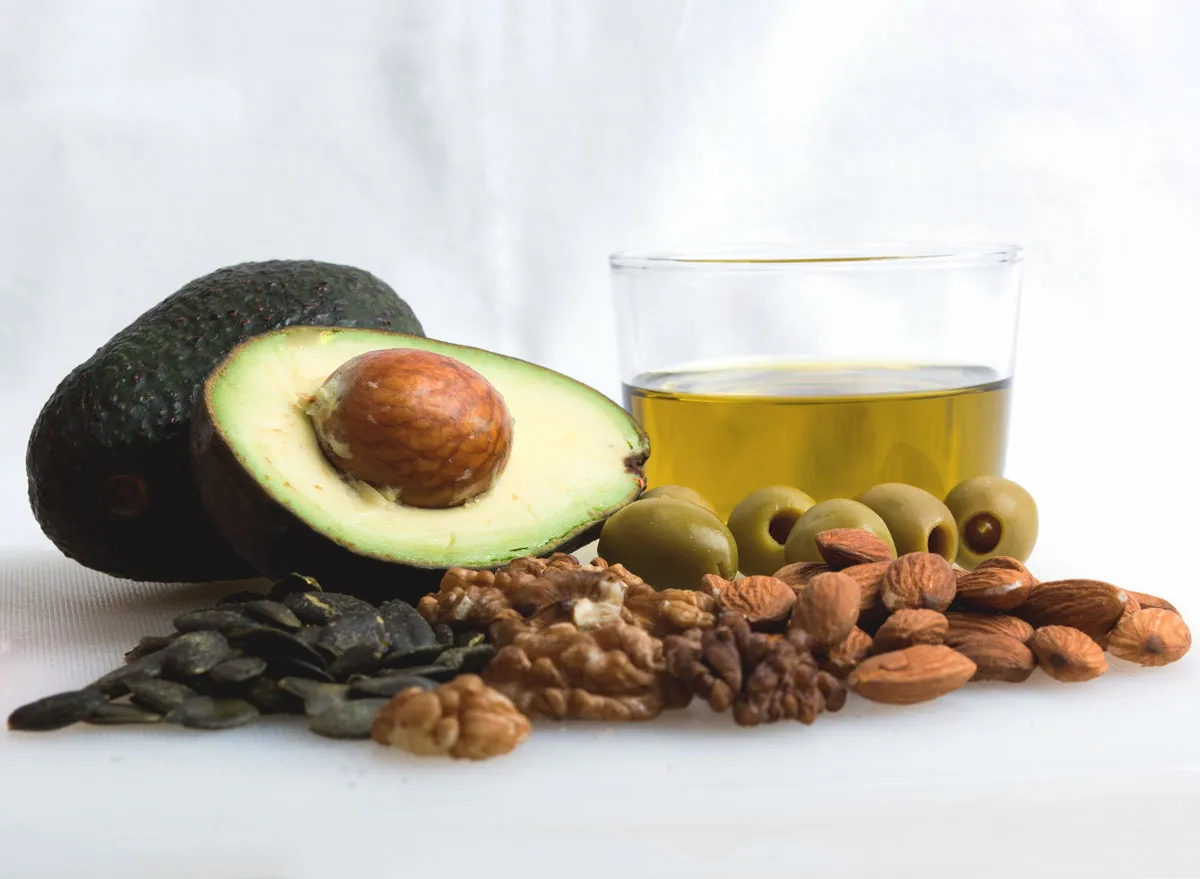
“Let’s clear this up once and for all—healthy fats are your friends and actually help with weight loss,” says Burak. “Fats such as olive and avocado oil, avocados, fatty fish (like salmon), nuts, and seeds will slow digestion and signal to your body that you’re full and satisfied.”
Research even shows that the medium-chain triglycerides (MCTs) from coconut may give your metabolism a boost by up to 120 calories a day.
“Healthy fats are also important to absorb fat-soluble antioxidants,” says Dahan. “Obesity is pro-inflammatory, antioxidants are anti-inflammatory—we need those antioxidants!”
Here are 20 Healthy Fats to Incorporate in Your Diet.
Get your fill of fiber.
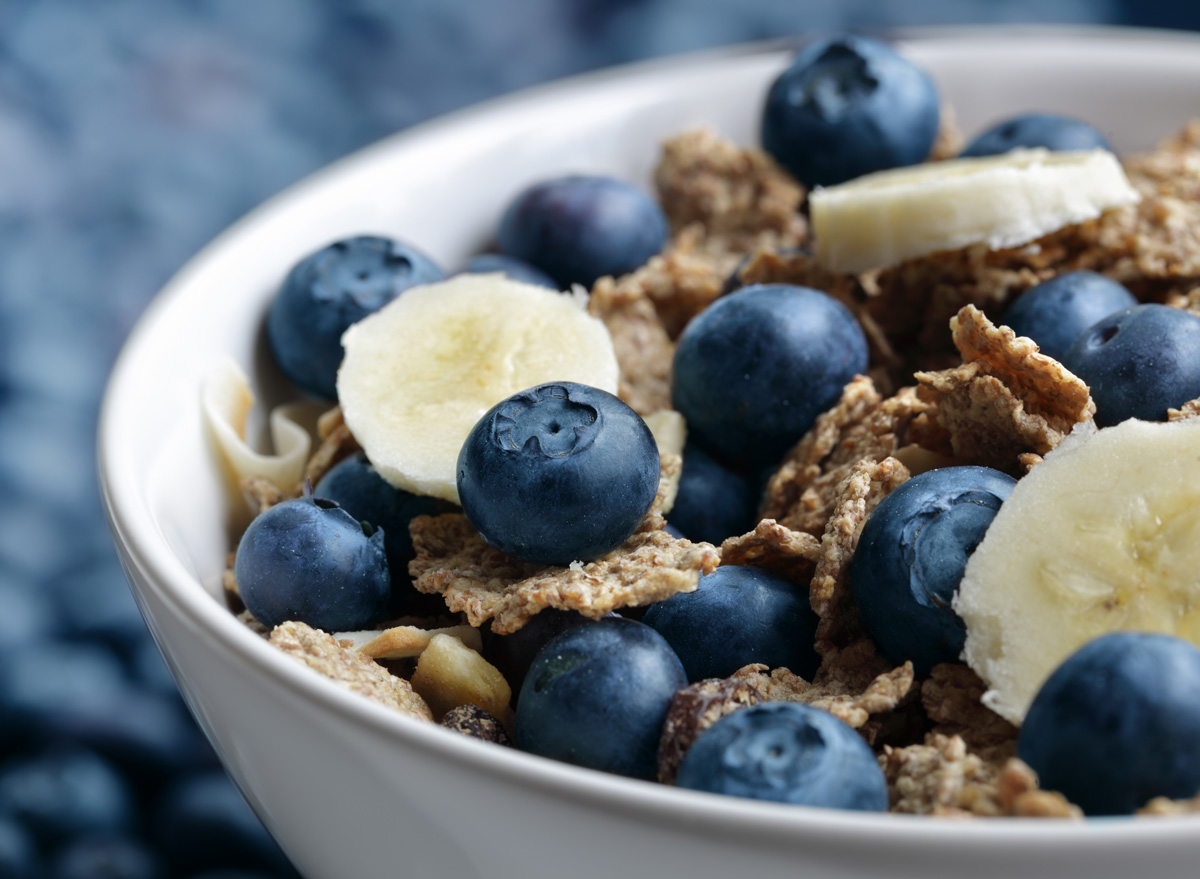
Though low-carb diets (like keto or Atkins) have gained in popularity, there’s one thing those diets are missing: Fiber. And while many starting out on these diets see a shift in their weight on the scale, it’s often due to water weight and not necessarily fat loss, explains Dahan. This is because your body stores carbs as glycogen, which binds water in muscles. When glycogen is depleted, the water in your muscles gets depleted as well.
Fiber is essential for digestion, brain health, and for keeping everything running smoothly, so to speak. Fiber even gives you more energy! It also fills you up, expanding your stomach and signaling to your brain that you’re full, while slowing the absorption of all the other nutrients you’re digesting, helping to keep blood sugar levels in check.
“Many people do not get the recommended minimum of 25-30 grams per day. By including more vegetables, 1-2 servings of fruit daily, nuts/seeds, and whole grains you can get in all that fiber and more,” says Kaiden, who emphasizes getting natural fiber from food over fiber powders or supplements.
Plus, “insoluble fiber in whole grains and vegetables provide bulk and a lot of chewing—both of which help kick in satiety hormones to tell us we’ve had enough to eat,” says Dahan.
Here are 43 High-Fiber Foods You Should Add To Your Diet.
Adopt “slow carb” not “low carb”.
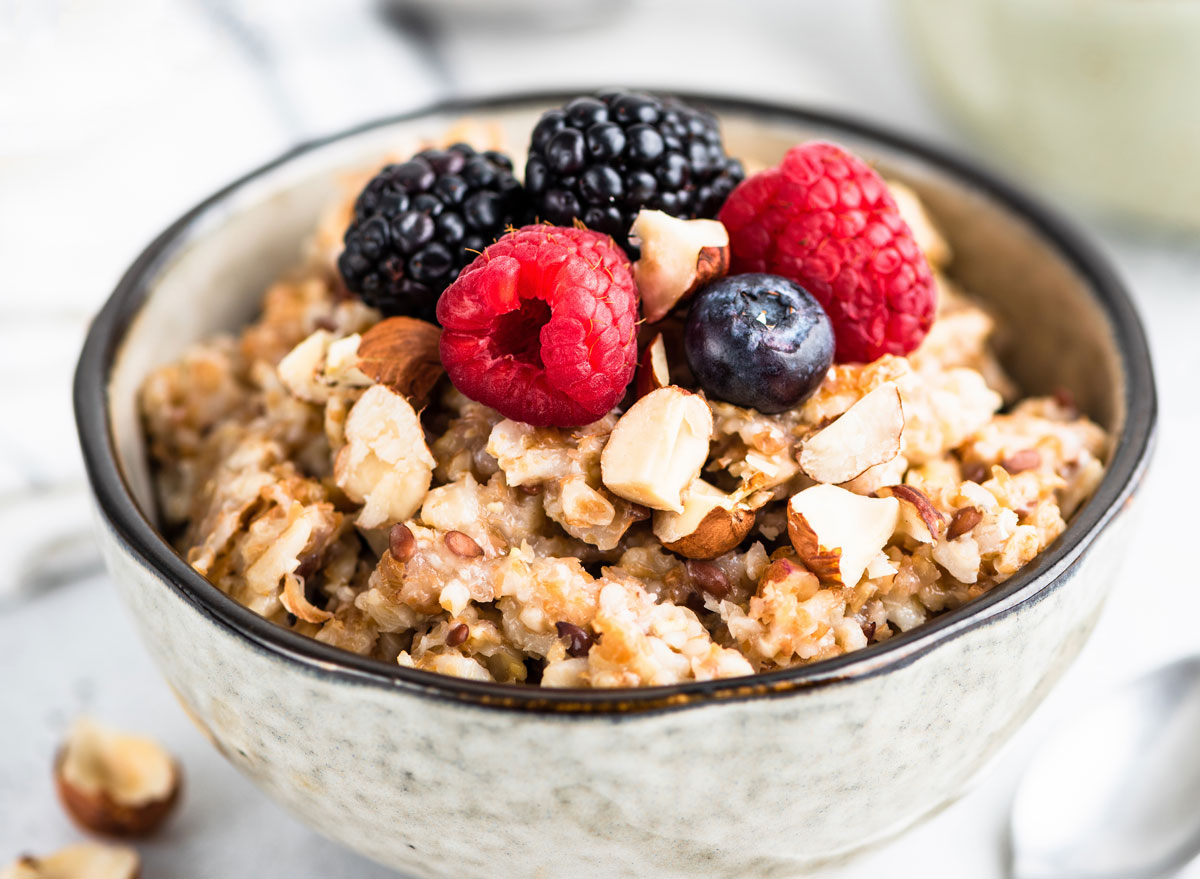
According to Burak, focusing on “slow carbs” means sticking with the “carbs that are more nutrient-dense and satisfying, and control your blood sugar better so you don’t feel the need to overeat them.”
Go for “grainy breads, fruit, beans, grains, lentils, and potatoes,” she says. “If you go low on carbs, you likely go low on vitamins, minerals, and fiber.”
“Plus, too little carbs can lead to cravings, binges, and overeating,” Kaiden adds.
Eat with your eyes, nose, and mouth.

Eating while distracted—working, watching TV, scrolling on your phone—leads to weight gain. But learning to eat mindfully can have the opposite effect. What does that mean? Mindful eating involves focusing on what you’re eating and how it makes you feel.
“Look at your food, pay attention to colors and aromas, put a bite in your mouth and taste it with your mind—focus on the flavors and textures, chew slowly, and swallow,” says Dahan. “Before you take the next bite, take a few seconds to savor the first. With practice, you’ll start to enjoy your food more, and be satiated with less.”
Bonus tip: Dahan recommends sitting at a table and using a plate for your food (rather than eating out of a package or snack bag).
Here’s More Proof that Mindful Eating Is Key to Weight Loss.
Drink half your body weight in ounces of water daily.

Our bodies are 55 to 70 percent water, so getting proper hydration is one of the most important things you can do for your health—and to keep hunger at bay.
“Many of us do not drink enough water, so we think we are hungry when we are actually thirsty,” says Kaiden. “Our body is telling us we need something and that thing is often water.”
A good formula to follow: Aim to drink half your body weight in ounces every day.
Need more motivation? Hydration helps your brain function properly.
Ditch added sugar.
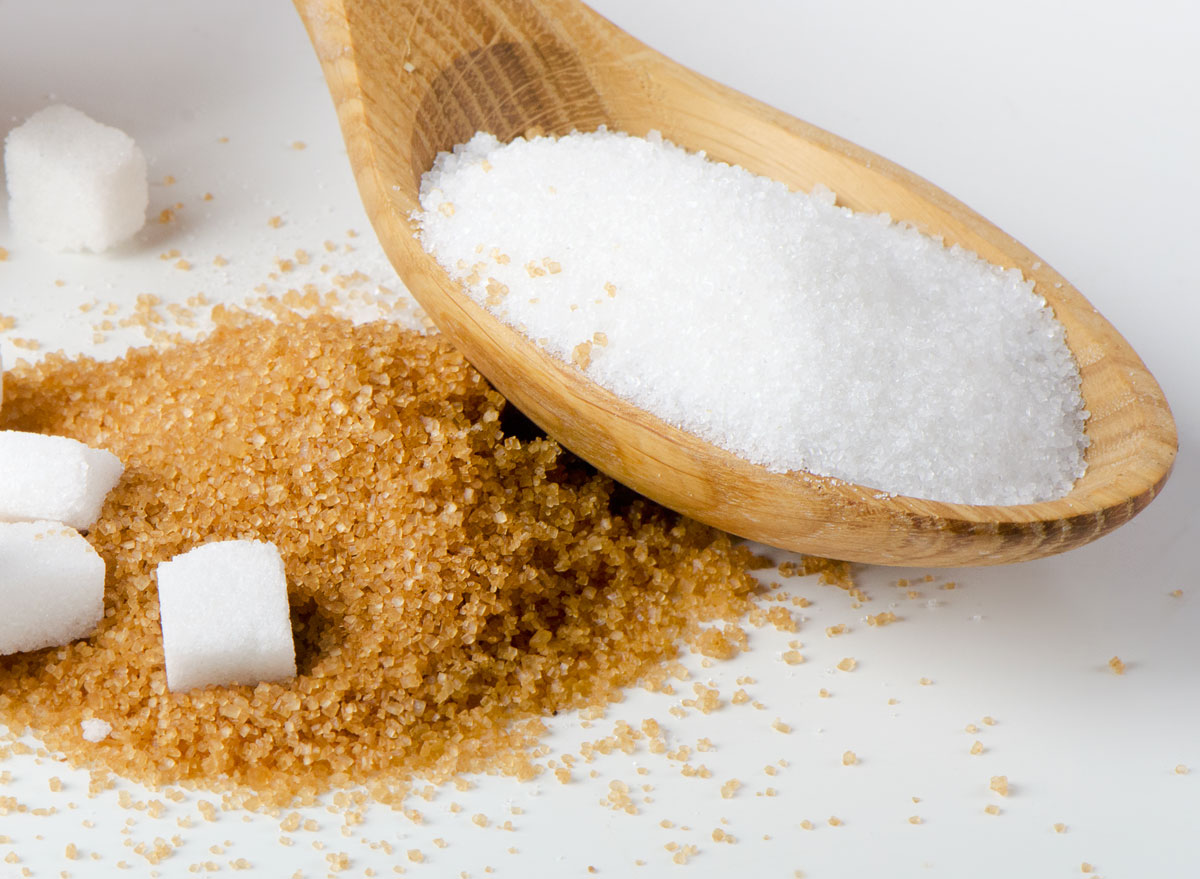
Not all sugars are created equal. The worst kind? Added sugars, which sneak into foods you’d never expect. “You may be surprised to find added sugar in things such as bread and salad dressing,” says registered dietitian Keri Glassman, who warns that eating foods with added sugar serves to increase your sugar cravings.
Plus, too much sugar has been linked to obesity, diabetes, and cardiovascular disease. We’ll let you in on a little secret: This one trick will cut your sugar cravings for good.
Hop on the strength train.

No surprise—exercise is key to losing weight. But you may be shocked to learn that cardio isn’t queen. If you’re in a weight-loss rut, try incorporating strength training into your routine. Lifting weights uses calories efficiently and is better for building muscle—and muscle burns more calories at rest than fat.
However, Kaiden reminds, “exercise is not a license to overeat, nor is it a fast remedy to burn extra calories after an indulgence. It is part of healthy daily life, and essential for weight loss and weight-loss maintenance.”
Stress less.

Easier said than done, mitigating life’s many stressors is critical.
“Stress can be a huge factor in an unhealthy lifestyle. It can cause people to overeat, undereat, skip meals, make poor food choices, and much more,” Sarah Koszyk, MA, RDN, told Eat This, Not That!.
In addition, cortisol (the stress hormone) can impact belly fat—and not in a good way. Over long periods of time, high levels of cortisol have been linked to abdominal obesity. Because it’s impossible to live completely without stress, it’s important to identify coping mechanisms, such as meditation, therapy, and working out. In fact, try to squeeze in daily movement since exercise is a great way to lower cortisol levels.
RELATED: Here’s What Happens to Your Body When You Meditate
Sleep more.

Lack of sleep is known to mess with your metabolic health. In fact, it’s vital for tons of biological functions, such as muscle growth, immune response, heart and brain health, and more. Over the last few decades, sleep deprivation has become a national epidemic—and our waistlines show it.
Cleaning up your sleep hygiene (habits such as powering down devices, setting the right temperature—just Google it) can help the number on your scale go down—and boost your overall well-being. Whatever you do, avoid these foods before bed—they are the biggest culprits when it comes to disrupting sleep.
Here are the Dangerous Side Effects of Not Sleeping Enough, Say Experts.
